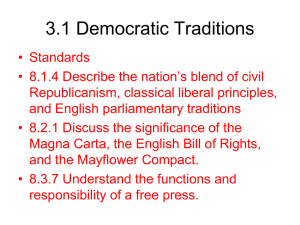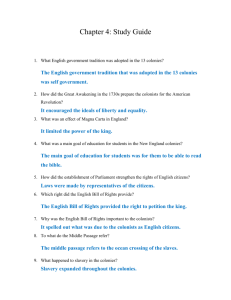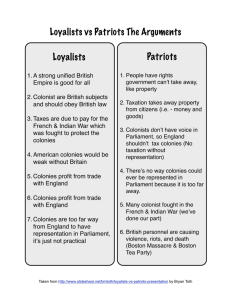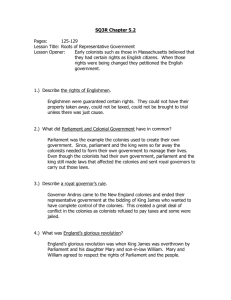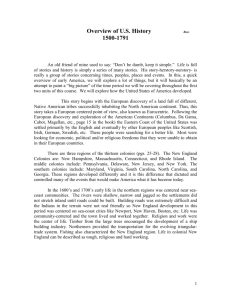BritishCOMMONLAW
advertisement
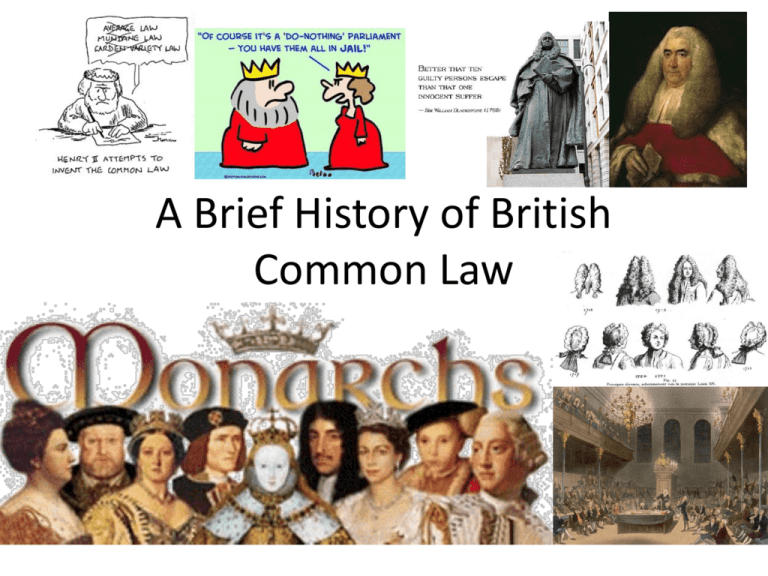
A Brief History of British Common Law The Magna Carta: Fundamental Rights and Liberties from 1225 • Signed in 1225 (Middle Ages) • King John was a tyrant who alienated everyone: nobles, merchants, peasants, and religious leaders; he was forced to sign a document limiting his power and establishing a government based on the rule of law. • This document was the “law of the land” in England, and it led to the custom of parliament to put the king’s power in check. • Due process was a fundamental component of the Magna Carta, and the British Colonists were very aware of their rights under the Crown. • http://www.youtube.com/watch?v=riUWuTpZfZ0 • King John of England (right) and an English baron agreeing to Magna Carta. A detail from the bronze doors of the U.S. Supreme Court building, Washington, D.C. What is Parliament? • • • • • • English legislature (lawmaking body) developed over time Kings would ask for advise from nobles The inner circle became more formalized and was called the Great Council There was also an informal system of hearing cases and making decisions at a local level By 1275, Parliament was more formalized and included elected representatives There was no universal suffrage; only wealthy landowners could vote • • During the middle ages, Parliament’s main function was to CONSENT to taxes requested by the king, who usually wanted to money to fight wars Parliament became a bicameral legislature (2 houses) – House of Commons (elected) – House of Lords (inherited) • • • • By 1376, Parliament could impeach the king’s ministers By 1414, the king was required to go to Parliament for approval of all laws and acts By the 1640’s Parliament was an institution capable of usurping power from the king. Parliament demanded rights such as habeas corpus—the principle that a person cannot be held in prison without being charged with a specific crime. The English Bill of Rights, 1689 (JUST SAY NO TO BAD MONARCHS!) • No royal interference with the law: monarchs cannot establish new courts or act as judges. • No taxation by royal prerogative: parliament must approve all taxes. • No church courts; only civil courts are legal. • No standing armies in times of peace, unless parliament approves it. • No fear of retribution for petitioning the monarchy. (freedom to petition the government) • No interference in the people’s right to bear arms. • No interfering with debates and proceedings of Parliament—they can assemble and deliberate without fear of retribution. • No fines or other forfeitures are allowed before a person is convicted of a crime. • No cruel and unusual punishment or excessive bail. 125 Years, 13 Schools of Government, All LOYAL TO THE CROWN Royal Colonies Proprietary Colonies • Under direct control of crown • King appointed a governor and a council • Colonists elected legislatures • New Hampshire • Massachusetts • New York • New Jersey • Virginia • North Carolina • South Carolina • Georgia • Under control of a proprietor—a person who the king had given a grant of land • Proprietor appointed a government, but king could intervene • Maryland • Pennsylvania • Delaware Charter Colonies • Charter given to colonists; self-governing • Governors were elected by male property owners • Connecticut • Rhode Island • The crown took back the charters from other colonies and made them royal colonies. • Had the colonies all been allowed to experience selfrule, would there have been a revolution? Freedom of the Press: The 1735 Trial for Libel of John Peter Zenger • Libel is the publishing of statements that damage a persons reputation The Navigation Acts • Mercantilism—economic policy that held that a nation prospered by exporting more goods to foreign nations than it imported from them • Colonies were a source of raw materials and a market for British goods • The first of the Navigation Acts were passed in 1651; the acts helped some colonists because they had a sure market for their goods in England • As trade expanded, the colonists began to feel that the laws favored British merchants • Smuggling became a way of life in the colonies in order to gain direct access to foreign markets • Shipments from Europe to the English colonies had to go through England first • Any imports from England to the colonies had to come on ships built and owned by British subjects • The colonies could sell key products, such as tobacco and sugar, only to England • Colonial Society Brainstorm • You may work alone, with a partner, or in a group of 3 (MORE PEOPLE = MORE WORK) • Read Chapter 4 Section 2 carefully for ideas • Draw your society using simple figures and word bubbles—you are not being graded on art work • You must have a minimum of 25 people doing 25 things PER PERSON in your group • Projects are due next Tuesday, but there will not be additional class time to complete them • Homework: Make flashcards for Chapter 4; if you had an A or B quarter 1, you may choose to be excused from this assignment

